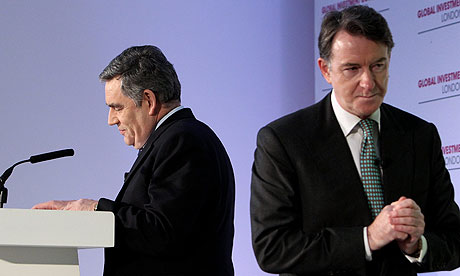
Peter Mandelson was without doubt the most intriguing figure in Gordon Brown's government. From 2008, when he joined it, he was arguably also the most powerful. It's unlikely he would contest either assertion. And yet, from what we have seen so far, his book offers little to help us understand the many complexities that made Peter Peter.
Political memoirs are usually good for reminding us what their subject did, and almost always deficient in explaining why. With Lord Mandelson the why is always the most interesting question. Perhaps one day a meticulous biography will provide some answers. But not until Mandelson can find the space to indulge in rather more self-analysis and self-criticism than we find here.
From the advance billing we might have expected more. I love the deliciously sinister TV ads, and the nicely judged title – The Third Man – complete with a cover picture that would not look out of place on a George Smiley novel. But while there is no shortage of intrigue and plotting, the story is depressingly familiar. That may be because Mandelson, who could never stop himself talking to journalists, helped put much of it into the public domain under the cover of anonymity while it was going on.
The book does reveal things we didn't know, although for the most part the revelations concern the judgments of others rather than those of the author himself. Those of us who were convinced Labour was heading for defeat under Brown's leadership couldn't believe that cabinet ministers didn't see it too. Now we know that most of them did.
We're also told that, as we suspected, Tony Blair reached the same conclusion pretty quickly. What Blair thinks about having his private views revealed in this way is another matter, and one of which we will no doubt hear more.
All of which brings us back to the big "why". Why when so many astute politicians, who had exhibited a ruthless determination to win in the past, could all see what stood in the way of victory, did they do nothing to remove it – or rather him. A large part of the answer lies in Mandelson. With little more than an arched eyebrow he could have set in motion the chain of events necessary to install a new leader. He didn't and we are still left speculating as to why. A fear of going down in history as a compulsive plotter? A sense of loyalty combined with lingering guilt for deserting Brown in the past? Sheer enjoyment at wielding so much power and having the fate of a prime minister in his hands?
Maybe Mandelson doesn't know the answer himself. But if he does, he appears not to be telling.

